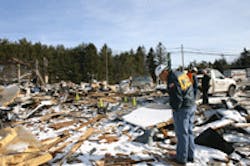CSB Provides Update on Safety Progress 5 Years After Little General Propane Explosion
According to CSB's 2008 report, the explosion occurred when a junior propane service technician was preparing to transfer propane, unsupervised, to a new tank from an old tank located near an outside wall of the store – a location that violated state and federal regulations. The technician removed a plug from the liquid withdrawal valve on the old tank, but the valve evidently malfunctioned and propane entered the store through the restroom ventilation system. The technician only had 45 days of limited on-the-job training.
Two propane technicians and two emergency technicians died in the blast. Four clerks in the store and two additional emergency technicians were injured.
Following the fatal event and the subsequent investigation, CSB issued twelve recommendations. Most have resulted in what CSB determined to be "Acceptable" action or are on the brink of completion. CSB Chairman Rafael Moure-Eraso said these adopted recommendations "will result in lives saved."
The results of CSB's recommendations include:
· The National Fire Protection Association (NFPA) issued a temporary standard providing guidance for personnel who work with liquefied petroleum gas. Moure-Eraso called this action "particularly gratifying" and encouraged NFPA "to permanently adopt the training and testing requirements for individuals who work with propane, helping reduce the loss of life and injury among propane workers and potential dangers to members of the public."
· The West Virginia State Fire Marshal's Office reported that the state fire code was updated in 2010, an action CSB said "serves as an example for other states."
· The Association of Public Safety Communications Officials developed a guide card for propane emergencies to assist 911 operators.
· The National Propane Gas Association (NPGA) conferred with OSHA and worked with the West Virginia 911 Council to develop emergency propane guidance for 911 operators.
· Ferrellgas, which for many years owned and serviced the existing tank installed by another company in violation of West Virginia and OSHA regulations, established a comprehensive safety management system and improved its inspection and auditing program to detect and correct safety deficiencies.
· In 2009, the Propane Education and Research Council (PERC) agreed to act on the recommendation to revise its Certified Employee Training Program. CSB holds the status of this recommendation as "Open-Acceptable Response" as PERC indicated it would submit its revised guidance documents shortly.
CSB also had urged the West Virginia Office of Emergency Medical Services to require annual hazardous materials response refresher training for all emergency medical personnel in the state. To date, training occurs only once every 2 years. According to CSB, recurrent annual training is critical for responders who must deal with hazardous materials emergencies such as with propane. CSB therefore voted this recommendation's progress as "Unacceptable. "
The board made as similar recommendation to the West Virginia Fire Commission. While no action as been taken, CSB is keeping the status "Open" on the understanding that revised evaluation forms requiring annual training have been completed.
CSB's safety video, " Half an Hour to Tragedy," offers a closer look at what events led up to the fatal explosion.About the Author

Laura Walter
Laura Walter was formerly senior editor of EHS Today. She is a subject matter expert in EHS compliance and government issues and has covered a variety of topics relating to occupational safety and health. Her writing has earned awards from the American Society of Business Publication Editors (ASBPE), the Trade Association Business Publications International (TABPI) and APEX Awards for Publication Excellence. Her debut novel, Body of Stars (Dutton) was published in 2021.
